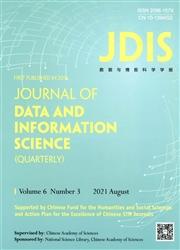土耳其国家社会科学期刊主编的出版行为和(不)资质
IF 1.5
3区 管理学
Q2 INFORMATION SCIENCE & LIBRARY SCIENCE
引用次数: 0
摘要
目的 本研究调查了土耳其管理 432 种社会科学期刊的 573 名主编的出版行为。对编辑资格的直接调查很少见,本研究旨在揭示编辑的科学领导能力。设计/方法/途径 本研究对比了编辑在国内期刊上发表文章的行为与在科学网(WOS)和 Scopus 索引期刊上发表国际文章的行为。研究认为,编辑在具有竞争力的 WOS 和 Scopus 索引期刊上发表文章的能力一直很强,这表明编辑的资质很高,而持续的内部行为和强烈的地方导向则表明编辑的资质很低。科学领导能力通过第一作者发表的论文来衡量。通过相关性检验和各种回归检验来确定出版行为的重要决定因素。研究结果 国际性出版物很少,而且集中在少数几个人身上,而内部出版物则很普遍,占国内所有文章的近 40%。编辑每发表一篇 SSCI 文章,就会发表 3.2 篇内部论文和 8.1 篇国内论文。62%(58%)的编辑没有发表过 SSCI(Scopus)文章,53%(63%)的编辑没有发表过一篇主要作者的 WOS(Scopus)文章,89%的编辑至少发表过一篇内部论文。只有少数编辑一直在国际期刊上发表文章;五分之一的编辑有三篇或更多 SSCI 论文,四分之一的编辑有三篇或更多 Scopus 文章。拥有外国博士学位的编辑是最合格的,也是最具有国际视野的,而非流动编辑则是最不合格的,在各项指标上都低于其他编辑。近一半的教授编辑以及大多数被 WOS 和 Scopus 索引的期刊编辑没有 SSCI 或 Scopus 出版记录,这说明了编辑整体资质的不足。研究局限性 本研究依赖于当地环境,这种环境鼓励发表国内出版物,但牺牲了国际期刊。在评估研究结果时,应考虑到这一环境,并牢记狭窄的地方更容易受到同行的偏爱。实际意义 不称职和任人唯亲的编辑对土耳其国家文学构成了迫在眉睫的威胁。持久的解决办法可能包括解聘和更换不合格的编辑,以及将数十种以可疑方式运作、科学作用不大的期刊除名和关闭。原创性/价值 据我所知,这是第一项记录国家期刊主编出版行为的研究。本文章由计算机程序翻译,如有差异,请以英文原文为准。
Publication behaviour and (dis)qualification of chief editors in Turkish national Social Sciences journals
Purpose This study investigated the publication behaviour of 573 chief editors managing 432 Social Sciences journals in Turkey. Direct inquiries into editorial qualifications are rare, and this research aims to shed light on editors’ scientific leadership capabilities. Design/methodology/approach This study contrasts insider publication behaviour in national journals with international articles in journals indexed by the Web of Science (WOS) and Scopus. It argues that editors demonstrating a consistent ability to publish in competitive WOS and Scopus indexed journals signal high qualifications, while editors with persistent insider behaviour and strong local orientation signal low qualification. Scientific leadership capability is measured by first-authored publications. Correlation and various regression tests are conducted to identify significant determinants of publication behaviour. Findings International publications are rare and concentrated on a few individuals, while insider publications are endemic and constitute nearly 40% of all national articles. Editors publish 3.2 insider papers and 8.1 national papers for every SSCI article. 62% (58%) of the editors have no SSCI (Scopus) article, 53% (63%) do not have a single lead-authored WOS (Scopus) article, and 89% publish at least one insider paper. Only a minority consistently publish in international journals; a fifth of the editors have three or more SSCI publications, and a quarter have three or more Scopus articles. Editors with foreign Ph.D. degrees are the most qualified and internationally oriented, whereas non-mobile editors are the most underqualified and underperform other editors by every measure. Illustrating the overall lack of qualification, nearly half of the professor editors and the majority of the WOS and Scopus indexed journal editors have no record of SSCI or Scopus publications. Research limitations This research relies on local settings that encourage national publications at the expense of international journals. Findings should be evaluated in light of this setting and bearing in mind that narrow localities are more prone to peer favouritism. Practical implications Incompetent and nepotistic editors pose an imminent threat to Turkish national literature. A lasting solution would likely include the dismissal and replacement of unqualified editors, as well as delisting and closure of dozens of journals that operate in questionable ways and serve little scientific purpose. Originality/value To my knowledge, this is the first study to document the publication behaviour of national journal chief editors.
求助全文
通过发布文献求助,成功后即可免费获取论文全文。
去求助
来源期刊

Journal of Data and Information Science
INFORMATION SCIENCE & LIBRARY SCIENCE-
CiteScore
3.50
自引率
6.70%
发文量
495
期刊介绍:
JDIS devotes itself to the study and application of the theories, methods, techniques, services, infrastructural facilities using big data to support knowledge discovery for decision & policy making. The basic emphasis is big data-based, analytics centered, knowledge discovery driven, and decision making supporting. The special effort is on the knowledge discovery to detect and predict structures, trends, behaviors, relations, evolutions and disruptions in research, innovation, business, politics, security, media and communications, and social development, where the big data may include metadata or full content data, text or non-textural data, structured or non-structural data, domain specific or cross-domain data, and dynamic or interactive data.
The main areas of interest are:
(1) New theories, methods, and techniques of big data based data mining, knowledge discovery, and informatics, including but not limited to scientometrics, communication analysis, social network analysis, tech & industry analysis, competitive intelligence, knowledge mapping, evidence based policy analysis, and predictive analysis.
(2) New methods, architectures, and facilities to develop or improve knowledge infrastructure capable to support knowledge organization and sophisticated analytics, including but not limited to ontology construction, knowledge organization, semantic linked data, knowledge integration and fusion, semantic retrieval, domain specific knowledge infrastructure, and semantic sciences.
(3) New mechanisms, methods, and tools to embed knowledge analytics and knowledge discovery into actual operation, service, or managerial processes, including but not limited to knowledge assisted scientific discovery, data mining driven intelligent workflows in learning, communications, and management.
Specific topic areas may include:
Knowledge organization
Knowledge discovery and data mining
Knowledge integration and fusion
Semantic Web metrics
Scientometrics
Analytic and diagnostic informetrics
Competitive intelligence
Predictive analysis
Social network analysis and metrics
Semantic and interactively analytic retrieval
Evidence-based policy analysis
Intelligent knowledge production
Knowledge-driven workflow management and decision-making
Knowledge-driven collaboration and its management
Domain knowledge infrastructure with knowledge fusion and analytics
Development of data and information services
 求助内容:
求助内容: 应助结果提醒方式:
应助结果提醒方式:


